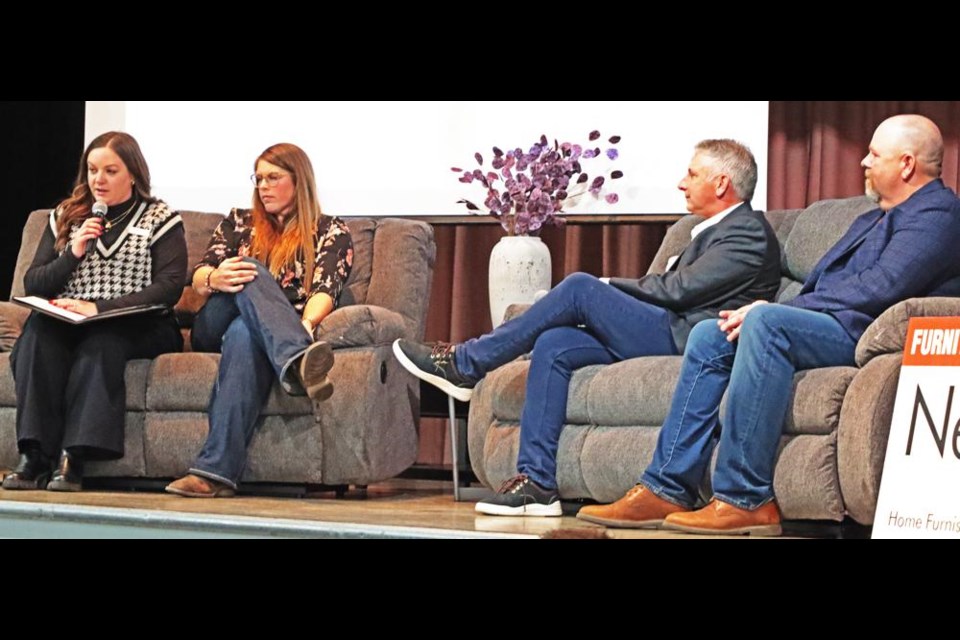WEYBURN - A panel of Weyburn-area producers, all past winners of the Golden Sheaf Award from the Weyburn Chamber of Commerce, discussed issues around modern farm operations, marketing and legacy, at the Ag Appreciation Night held on Nov. 5 at McKenna Hall.
The evening also included the presentation of this year’s winners of the Golden Sheaf, to Derek and Tannis Axten of Axten Farms Ltd. at Minton.
The panel was moderated by Jordan Szczecinski, vice-president of the Weyburn Chamber board, and included Sarah Leguee of the Leguee family farms at Fillmore; Alex Galarneau of Prairie Heritage Seeds of Radville; and Mark Bratrud of Rent Pro Ag and Coyote Business Strategies of Weyburn.
The producers were asked what message they would want to pass on to people who are not farmers and are outside of the world of agriculture.
Bratrud said non-farming people need to realize the level of risk that farmers take in their business every day, and every year.
“When farming is good and things are going well, it’s easy for everyone to see the success. There have been a lot of people who risked a lot, and a lot of people didn’t make it. That’s the biggest thing, the amount of risk farmers take on all the time,” he said, pointing out when a farm does well, people just don’t realize the amount of risk they took to get there, and the fortitude to tough out all of the good and bad years to make a successful farm operation.
“Just getting the message out of what we’re doing,” answered Leguee, noting many people in cities, like Regina, “don’t have any clue, even what the difference between a tractor and a combine is, never mind what we’re doing. We are really conscious of what we’re doing. We’re not trying to kill anybody, we’re trying to produce safe food products to all people. This business costs money, and we do the best job we can, as efficiently as we can – but from the outside, how do you know that?”
Galarneau said his message would be to the consumer, to inform them about the costs of farming versus the price they pay at the store for their products.
“We have about the lowest food prices in the world, and we complain about it too much. If you travel the world and see what other people are paying, you’d be very thankful and should hug a farmer. The first thing that happens when food prices go up is say that farmers are getting rich. You have no idea of the returns. I wish consumers would understand how hard it is for them to grow a crop, and the risks we take. I don’t think people know, we get one paycheque a year, it doesn’t come every week.”
Getting into the issues around planning and transitioning to new generations on the family farm, the producers were asked how this was being handled in their farm operations.
Bratrud noted he and his family were still transitioning, as this year he and his wife made the decision to rent out their farmland after farming it for the past 20-plus years. This included land that has been in his wife Bobbi’s family for the past 125 years in the Weyburn area.
“Prior to the transitioning, it was very transactional and very professional. We had from day one ensured everyone was very clear, so everyone understands where they were, and the ownership was never confusing,” said Bratrud.
As he is on the provincial farm ownership board, he noted they have seen a number of farm foreclosures, and said, “A lot of those were just breakdowns in communication. What I’ve learned is you should be very clear in communicating all the time. Often, money is the ‘elephant in the room’, and if you just keep kicking it down the road, it doesn’t get any easier.”
“Looking back when we started our transition, we should’ve been more formal about it. We didn’t know what was going to happen,” said Leguee. “Just having those conversations and asking for help is important, and there are so many places you can get advice from.”
She noted her brother Jake set up an advisory board for the farm about four years ago, and admitted at first she felt like “a deer caught in the headlights” as questions came, but they found the right people to help out, “because you can’t be an expert in everything.”
Galarneau noted he also is currently going through a transition phase on their farm as they transition into a fourth generation to be involved.
He agreed with Leguee and said it’s important to formalize agreements and have things set out, including exit agreements.
“Make sure everybody is aware of what their roles are,” he said. “I have hopes for the next generation, if they choose to work together. It has to have an agreement, share structures, exit agreements. My son is farming his own operation, and my daughter is farming her own operation … We’ll work through it and keep transitioning.






